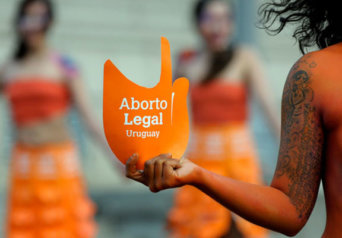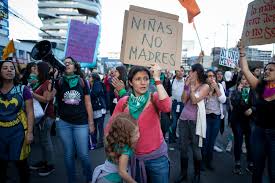- About
- Topics
- Picks
- Audio
- Story
- In-Depth
- Opinion
- News
- Donate
- Signup for our newsletterOur Editors' Best Picks.Send
Read, Debate: Engage.
| located: | El Salvador, Nicaragua, Honduras, Suriname |
|---|---|
| editor: | Magdalena Rojo |
Since the beginning of this year, four women charged with committing abortions have already been freed from jail in El Salvador before their sentence was over. They all said they miscarried. At the moment there are still about twenty other women in jail for abortion in El Salvador.
The Central American country is one of the four countries in Latin America where abortion is not legal under any circumstance. Nicaragua, Honduras, and Suriname also do not allow abortion, not even in the cases of rape, incest, or if a mother's life is in danger.
On the other hand, only Uruguay, Guayana, and Mexico allow abortions without restrictions (usually in the first trimester). All other countries across the region have some kind of restrictions with the majority approving abortion to save the life of a mother.
The consequences of such laws are numerous. Many women undergo unsafe procedures putting their health at risk. Around 760,000 women in Latin America and the Caribbean are treated annually for complications from unsafe abortions.
The Planned Parenthood report from 2014 states that Latin America has one of the highest rates of pregnancies of adolescent girls. The risk of maternal death in these mothers in low – and middle-income countries is twice higher than that of older women.
Often the argument of those against abortions is used that if allowed, the number of abortions would rise. It does not have to be the case if unrestrictive abortion laws are accompanied by awareness-raising campaigns about, for example, reproductive health of girls and women, use of contraceptive methods or violence against women.
There is no doubt that the question of abortion is a huge dilemma, more so in the countries with a strong Roman Catholic background, which is the case of many Latin American states. However, abortion laws can also be seen as one of the indicators of gender equality in the country. Many other statistical indicators, such as numbers of femicides, occurrences of different forms of violence on women, or unequal salaries for men and women, suggest strong patriarchy and machismo still prevail in Latin American countries.
Abortion is the choice of a woman, especially in extreme cases, such as rape or life-threatening conditions. And it is never easy to make that decision. It is an issue that a woman should have an option to decide about, not only men in power.
Image: Women in Uruguay engaged in a long campaign of civil protest in order to achieve the right to legal abortions. (womensenews.org)

